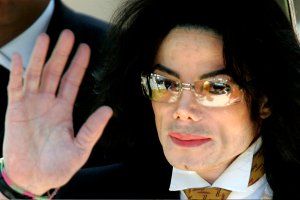
I feel a little guilty as the anniversary of Michael Jackson's death approaches. I first felt it shortly after his death, and it's still there, lingering. It's the guilt of abandonment, of having loved Jackson as a performer for so long and then turned my back on him as he struggled with the many personal demons that eventually aided in ending his life.
Though to be honest, my "falling out" of love—yes, it really felt like that, especially when I was young—with Michael happened a very long time ago. In my world, starting when I was 4, Michael Jackson was the sun, the moon, and the stars. His soulful singing was just frosting on an already tasty chocolate cake that I couldn't get enough of. My mother brought me every picture, album, and poster she could find to feed my Michael addiction. As I grew up, Michael only became cuter in my mind. Yes, his nose got a little wider and his skin a little pimply. but that didn't faze me one bit. I could stare for hours at the album covers with him and his brothers, just blown away by the innocent sweetness of his smile and the humble vulnerability in his eyes. Every birthday always meant a Jackson album, T shirt, or lunchbox as a gift. When I turned 13, my family drove two hours from Augusta, Ga., to Atlanta to see the Triumph tour featuring all the brothers on stage. I promise you my life was never quite the same.
But then, something began to change about Michael that I didn't like. Piece by piece, the gorgeous little brown boy disappeared before our eyes. I still worship his über-hip album cover for Off the Wall, the one that featured him stylishly posing in high-water pants, sparkly socks, and a mega 'fro. That music and picture still remind me of Michael on his own and at his very best—before the fame of Thriller sent him into another stratosphere and clearly altered his reality forever.
That new reality was as plain as the nose on his face, which became more narrow. Every other feature began to morph into something unrecognizable, too. His skin began to get lighter. For the first time in my life, I began to lose interest in Michael and his music. I didn't and couldn't understand how he could dismiss his own good looks and not understand that by rejecting them he was also rejecting everyone that resembled him.
At 13, I had no idea what Jackson had to face as a young African-American man catapulted to international success in early '80s. It was a brand new world, with music videos and MTV and Michael, Michael, everywhere Michael. He quickly became the biggest African-American celebrity (actually, celebrity period) in the world, perhaps of all time. In retrospect, at a mere 23 years old, Jackson was most likely ill-equipped to handle the worldwide adulation he'd ultimately receive. Born in Gary, Ind., during the turbulent civil-rights movement and with a stage father often referred to as abusive, Jackson had to find some way to navigate in a world full of the uncharted and unknown. Not surprisingly, he stumbled—a lot.
But how could any us appreciate the toll that journey took on his psyche? All I could see then from my pretty-in-pink '80s bedroom were glossy Ebony magazine photo spreads with the entire Jackson family appearing as though they hadn't a care in world. I truly thought it was "all good" at the Jackson house. Of course I heard Michael say he had a skin disorder that made his skin lighter, but I didn't believe him. Even when his hair and skin caught on fire during the filming of that Pepsi commercial in 1984, I failed to grasp the severity of his injuries. That one incident provided so much comic material for late-night shows that I don't think anyone ever truly felt his pain.
Only after his death were the detailed, graphic tapes of the Pepsi commercial released. In them, you could see Jackson's scalp in flames and the look of shock and horror on his face as he was lifted into the ambulance. I had to wipe tears the first time I saw that. Who could survive third-degree burns on their scalp and ever really be OK again?

I've wiped a few more tears for Michael since then. Tears because he actually did have the diseases lupus and vitiligo—one incredibly painful and the other mentally taxing. Tears for years of wasted anger at him for his mindless indulging in everything from that damn monkey Bubbles to his oxygen tanks and buying the bones of the Elephant Man. And yes, I also have tears for his most disturbing bad choices that led to charges of child molestation and abuse. Though he was acquitted twice, it pains to me think that his judgment was so poor and misguided when it came to dealing with children—whether anything untoward happened or not. But ultimately, on June 25, I'll cry again for the beautiful brown boy with the bright eyes who changed the world forever with his music, but lost his soul along the way.
Uncommon Knowledge
Newsweek is committed to challenging conventional wisdom and finding connections in the search for common ground.
Newsweek is committed to challenging conventional wisdom and finding connections in the search for common ground.





